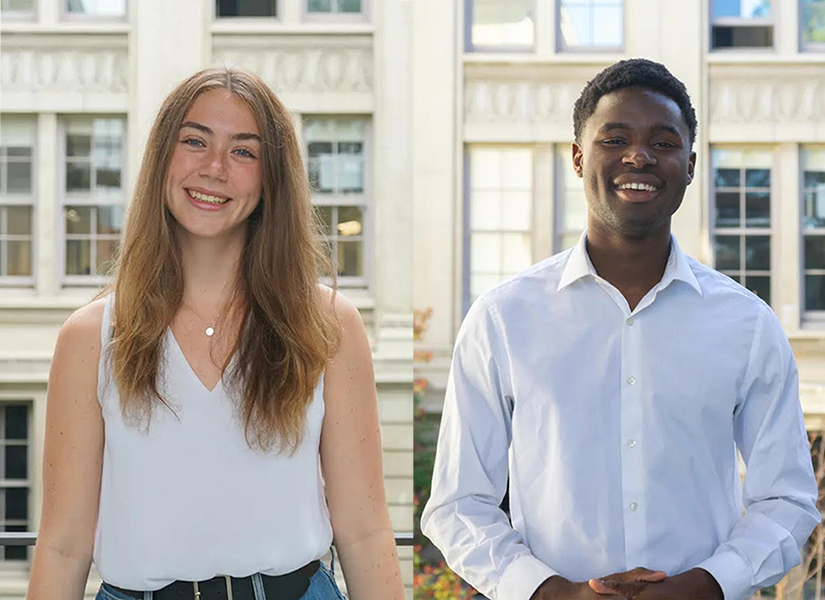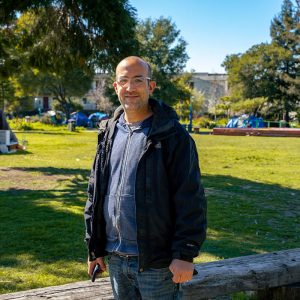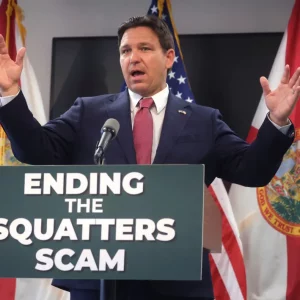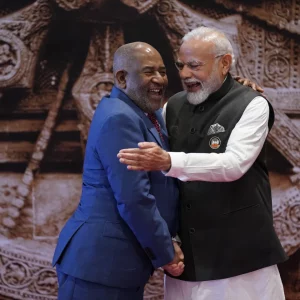From 12:00 am on April 4th to 11:59 pm on April 6th, UC Berkeley students will have the opportunity to vote in the 2022 ASUC Elections online via Calink and at physical polling stations across campus. This year’s ASUC election is the first since in-person instruction has resumed. As an undecided voter, the author interviewed Catherine Bauer (Student Action) and Chaka Tellem (Elevate Cal) to provide voters with additional insights into the two leading ASUC Presidential Candidates. Both candidates were given a series of identical and personalized questions. For more information on the candidates and voting procedures visit the ASUC website. Please note that content in parenthesis is added by the author to provide background information and context.
Here’s a question that stumped Ted Kennedy, why do you want to be President?
Catherine Bauer:
I knew I wanted to run for ASUC President my first semester of freshman year. I started in the ASUC as an intern in Senator Apoorva Prakash’s office, and I co-authored a $40,000 grant proposal that resulted in free period products seen in Moffitt Library and other buildings on campus. I was able to experience a lot of the good that the ASUC can do, but I’ve also seen a lot of the mishaps that the ASUC has gone through and have been witness to harms that the ASUC has caused. Right now, I think we’re in the midst of a crisis in leadership and our ASUC Senate class and executives don’t answer to anybody. They operate independently, which has resulted in further decentralization. Students can’t access the ASUC because the ASUC isn’t working together. I know we need a new leader, somebody who’s gonna step up and work on projects that students want on campus that will benefit all students on campus, while also uplifting marginalized groups or students who haven’t felt represented by the ASUC. This [the ASUC] is an institution and we need institutional change. We need projects that are going to support students on the ground and that’s why I want to be President.
Chaka Tellem:
A lot of people at Cal know, before even getting to campus they want to be ASUC president. And I think in a very unorthodox way I didn’t. I didn’t even know I wanted to get involved in the ASUC when I first stepped foot on campus. Why I wanted to become president really grew with the experience I’ve gained and in assessing campus needs. For me, working in the ASUC and seeing that we are actually a beacon of change and an instrument to serve students. And also realizing that there is a huge need for that service. I really want to help students and I think President is the best position to help as many students as possible.
Assuming you are victorious on election day, if we meet a year from today, what would have to happen for you to feel your term as ASUC president was successful?
Catherine Bauer:
That’s an amazing question. A few things would have to happen. The first one is, students would have felt supported. Within that year, students would know deep down that the ASUC values them and sees them, and wants to help them. I envision an Office of the President that touches students at their hearts on the ground, so they know that the ASUC will be there to support them. The other thing that would make me feel like I had a successful term is accomplishing my campaign goals. 24-hour libraries, better alumni relations, so students don’t have to apply to a plethora of internships just in the small hope of getting one. Students would have better housing options. Or at least know their rights as tenants. Students would have better access to club funding and support, ABSA [club funding and spacing] wouldn’t be such a hard thing to reach co-ops on campus would feel supported as well. Rochdale would have the support it needs from the university and would be able to get the renovations it needs that would make me feel like I had a successful term.
Chaka Tellem:
One of the things I plan on doing is addressing a lot of the funding issues that we see on campus. There are a lot of organizations and programs across campus that are underfunded. I’ve noticed that as President. I think a referendum where funds would be used to address those inequities. I think that we can get going to where funding increases year by year for organizations. There are a lot of cultural things that need to change within the ASUC so we can better serve students. Having a better presence on campus, so students are aware of who we are and how we can help them, and that we’re a resource. Reestablishing relationships with certain communities on campus that may not see ASUC in the best light. A lot of that is for valid reasons, seeing those relationships within these communities on campus and the ASUC reconvene, or establishing rapprochement, as the French would say, is something that I would view as victorious.
In what areas does the ASUC have the most room for improvement?
Catherine Bauer:
A hefty question for sure. The first one, like I mentioned, is a crisis in leadership and organization, we need to be very sound in our structure. The ASUC needs a leader that the Senate class and that their executives can look up to, and that they can learn from and call upon when something goes wrong. The second one is centralization and project management. What ends up happening a lot of the time is that somebody has a really good idea. And it’s such a good idea that multiple people are working on it, but they’re working on it separately, not together, which creates inaccess to the resource that they’re trying to grow, which is unfortunate. The third area where I think we can improve is the tangibility of projects. A lot of the time we have these really big, very good ideas, morally righteous ideas. But, in reality, students need things that are going to support them now, like, months ago, they needed hybrid options, that was a huge goal, or there was a labor walkout, and students needed to know about that as well. So we have to keep ourselves up to date with the current events on campus and not just events that are supporting one group of students but the entirety of this campus and it’s a large student body, you know, that’s 32,000 undergraduates. 40,000 if your accounting graduate students, running for President is like running for mayor, it’s huge. but having people on the ground having those foot soldiers to look around and find out the scope of projects that need to occur is going to help us a lot. And the other thing that I think we can improve on is starting projects over summer. There are leadership workshops that are mandatory for Senators and Executives. And during those leadership workshops, they get to meet one another, which is great, but during summer, it’s a crucial time to plan your projects. You know, we can’t wait, we can’t afford to wait. I started campaigning in January, which means that, you know, my term might not start until August 22 or 26. Knock on wood right. But planning the projects needs to begin the second that you start campaigning not the second that you get into office and that’s a mistake that I think a lot of elected officials make.
Chaka Tellem:
I think publicity is a huge thing. There are a lot of people that don’t know what the ASUC is or what we do for them. And I think that’s doing students a disservice because that means they’re not aware of resources that they can tap into. It’s also doing us a disservice. At the end of the day, we’re here to serve students, and we need to get student voices in order to best meet student needs. Making sure that we’re doing the best to have a presence on campus, and that students feel comfortable and safe, getting involved in the ASUC, whether that’s through elections, through an office, or talking to ASUC officials and letting us know how they feel. I think also within the Senate [Mr. Tellem was a Senator before he was elected President], I noticed that collaboration wasn’t at its maximum efficiency, nor was it exercised to the extent that I think it should be in and out of the Senate, execs [Executive Officials] as well. When we’re fragmented and trying to do our own little things. We get far less done than when we work together on issues. So I think that’s something that the ASUC can improve.
What skills do you believe are essential for a President to lead the ASUC next year?
Catherine Bauer:
There are certain qualities that really good leaders have. The first is that really good leaders build more leaders. That means that the people in your office after about 12 months of working with you should want to go out and be leaders on their own. The second quality that I think a really good President should have is an ability to negotiate. Your ASUC is your number one negotiating tool. When you walk into a room with Carol Christ or one of the Vice-Chancellors or the Dean of Students, you need to be able to successfully negotiate demands from students. The ASUC doesn’t have all the resources in the world and if ASUC can’t provide something you have to turn to the university. So you have to be a successful negotiator. The third quality that I think an ASUC President has to have is tenacity. You have to go into it with charisma and hope and optimism and keep that as core values moving through the year and I know this because I’ve been in the room. I’ve been in the room with every administrator. I’ve been in the room on my own during this campaign trying to find out if we can actually afford things like 24-hour libraries. I’ve been in the room with the Dean of Students talking to them about how dancers are practicing barefoot outside until two in the morning. I’ve been in the room. The fourth quality that a successful ASUC President needs to have is delegation. Like I said before, we have 30 weeks. That is not a lot of time to complete a project. If you’re gonna have 10 projects on the docket, you need to have 10 very successful leaders who know how to accomplish that project in that timeline. You know, we have professors on this campus that bring in students to create projects. There are students all over campus who have figured out successful ways to negotiate with UCPD. They’ve also figured out ways to implement projects that would reduce the rates of SVSH [sexual violence & sexual harassment] within that 30-week timeline. You need to bring in those student leaders and give them the framework and support them and back them as they complete that timeline. And that’s delegation, you have to put your trust in those students to lead this campus with you. That’s going to be my fifth and final point is your ASUC President is supposed to fight with you and for you. This ASUC President is not supposed to speak on behalf of you, but they’re supposed to draw community leaders into the room. So you feel represented when they walk into that meeting with Carol Christ every month. It’s important that we bring in those voices, and that we recognize them when they send us emails or when you show up at community events.
Chaka Tellem:
Someone that understands the gravity of the situation we’re in. The class of 2022 to 2026 is in a really unique position. Classes [previously] inherited a culture, norms and values that they continue. The pandemic and the two-year hiatus of empty classrooms interrupted a lot of the status quo that we saw as Cal before. A lot is up in the air, the norms that we set now, in these next few years, will be the norms that future classes follow for decades. It’s really important to understand that Cal is a unique place in the sense that within one-mile radius, we have folks from almost every nationality, speaking almost every language and every walk of life, you don’t get that everywhere. A leader should understand the importance of multiculturalism, that can speak to different communities that he, she or they are not a part of, but understand and empathize with them and make sure that their needs are met. If we don’t have a leader with experience making sure we have an equitable, hospitable environment, regardless of where you come from, your ideologies, your culture, your beliefs, that’s dangerous.
What should be the ASUC’s top priorities for the next school year?
Catherine Bauer:
The ASUC’s top priorities should be the student’s top priorities. That’s housing. That is 24 hour libraries for students that live in co-ops, that’s Rochdale [a student co-op] support, it’s alumni relations. This is an ongoing issue that our university has. Our Director of Alumni Relations [Jay Dillon] knows it and they’re trying to make it better, but I think it’s a huge priority for students on campus. The other thing that needs to be a priority for the ASUC is taking a really close look at ABSA because it seems like a lot of clubs on campus can’t access two things: number one, their own funding, and number two, rooms to host their meetings. And that has left multiple clubs in a bind because they either can’t afford what they need to go on trips for debate tournaments, to host community events, among other things, so we need to take a really close look at ABSA and figure out if there’s a way to recenter it to make it more student-focused and ensure that students in RSOs [registered student organizations] and other clubs on campus can access those two things. So in conclusion, housing, alumni relations, RSOs, and student support on campus.
Chaka Tellem:
Understanding the importance of the precedent that we set this upcoming year with cultural norms, we need to make sure that the issues that we’ve seen at Berkeley before the pandemic and especially during the pandemic, are not issues that happen as we transition out. I think a lot of students have concerns with student culture and the student experience. For a lot of underrepresented groups, like Black community and other communities. There’s a lot of microaggressions and sometimes campus climate is very hostile. Making sure that, you know, the norms that we’re setting now are norms that incentivize and that encourage the inclusion of diverse communities and especially underrepresented communities that may not have the number of power to advocate for themselves, but at the same time, we are stifling or disincentivizing behaviors of exclusionary practices right and that includes ASUC you know, the ASUC is seen as a very privileged space, a very… [interviewer asks “Elitist?”] Elitist I tried not to say but I mean, you said it, and that that means something. That means that students are feeling this way. Making sure that’s not the reputation that people have because that connotation of the ASUC being elitist is why we don’t have certain students in the ASUC [underrepresentation of transfers and first-generation low-income students]. The ASUC should reflect the diversity of Berkeley and should lead in advocacy and inclusion.
Many students feel the ASUC club funding process, officially known as Annual Budgeting and Spaces Allocation (ABSA), is unfair. Do you agree? If so, what reforms do you propose?
Catherine Bauer:
I think unfair is an interesting choice of words. I think that frustration is probably the local sentiment concerning ABSA. every single club I’ve talked to and it’s a lot at this point has expressed frustration so you’re spot on with that question. I propose a working group of RSO leaders and the CFO of the ASUC, and maybe me or somebody from my office, and anybody else who wants to be involved to look over ABSA and figure out what’s going wrong. Is it the way that students are applying? Is it the algorithm that we’re using to allocate the budget? Is it the surplus cash that we can give clubs afterwards? Is that the process that’s going wrong? We need to pinpoint it and figure out how to eliminate the problem. And that means getting down to the nitty-gritty and I don’t want it to take a long time because we don’t have a long time. In the ideal world, we would spend the first couple weeks or the first couple months of school, getting down to the nitty-gritty of ABSA and how students apply, and what’s going wrong. And in the next couple of months, we would start the reforms. I think that clubs are very frustrated with ABSA right now. I have to agree with that frustration. I’ve taken a look at ABSA and myself. I’ve had to report finances on Calink. It’s frustrating and confusing. And if somebody who’s worked in the ASUC since their first semester of freshman year finds it frustrating and confusing. I am sure that other students on campus do as well. It’s my hope that we can eliminate club funding bias.
Chaka Tellem:
I believe that ABSA should be reformed. As someone who was a Senator and sat on the Finance Committee, which dealt with ABSA allocations Senate contingency funding, I’ve had first-hand experience of the inequities. I think it’s very important that the next President has experience with how the current ABSA process is functioning. In order to change an institution for the better, you need to understand the institution and its problems. People from outside will see that there are issues but if you don’t know how the issues arise, and why they’re occurring, you may do more harm than good trying to change it. Having someone without that Senate experience, without the Senate contingency experience, or finance committee experience, and dealing with money like I do as President could be a huge risk. Working with the CFO, currently Henry Isselbacher, and making sure that when we’re looking at Club funding, we’re not weighing the amount of years that organizations have been ASUC sponsored as big a mechanism in [determining] the amount of funding that they receive. Right now that’s one of the biggest criterias used in the algorithm that dictates how much clubs get [funded]. With the pandemic, we saw really amazing organizations went away [or miss one ASUC funding cycle]. And, when you lose ASUC sponsorship for one year, you have to start all over again from getting upwards of $7,000 a year to a maximum of $500. Organizations can’t afford that difference. I don’t think students should be penalized for the lack of engagement they had to experience because they weren’t physically on campus. I think Henry Isselbacher is the most knowledgeable person on campus when it comes to ABSA. I want to loop him in, if I get the opportunity to be sworn in again in May so that we can work on this over the summer and make sure that a lot of those issues are addressed.
How would you respond to students who feel the ASUC is neglecting campus issues in favor of symbolic stances on national and international issues?
Catherine Bauer:
I share your concern, I empathize with you. But I would also express that we have an External Affairs Vice President for a reason we have a portion of the ASUC that’s dedicated to looking at issues beyond our UC Berkeley community. And that’s important we need those people when issues that are going on within the state or federally or internationally affect us right here at home. We need to be aware of those issues. But at the same time, we can’t let issues or crises that are going on internationally. pull us away from the work that we’re doing right here at home. We can’t let situations that the ASUC President has no direct control take us away from the problems that are affecting students now. So if there’s an international crisis, and that crisis is affecting students on UC Berkeley’s campus, then we have an obligation to support students here. But in reality, your ASUC President does not have the means to get a congressperson or your US President on the phone and make a recommendation. We can hold drives to contact your Senator or write your Senator. But if students need something, it should be our top priority to meet students needs. And if those students are the ones being affected by the crisis internationally, then we have a responsibility to meet their needs as well. But forcing issues within the ASUC that we cannot directly affect is performative and we need to make sure that if we’re bringing up issues, we’re not just making statements that we’re acting upon them. I would encourage my peers to be very rigorous about which issues we’re bringing up, which crises we’re addressing and how we’re addressing them. Because the enumerated duties within the constitution of the ASUC are very clear. It is your President’s duty to support students. It is short, simple, and sweet. And that is their job. If your President isn’t fulfilling that, then we need to hold them responsible.
Chaka Tellem:
I hear you. As a Senator, I saw it happen. I saw resolutions enter the Senate, read every single one of them and I saw that there is a proclivity to make stances which I think at times are very important, right? Folks need to understand that the ASUC is one of the most powerful student governments in the nation. People do look at what we do to model their behavior after and as symbolic as your stances may seem, they have some weight to them that maybe students on campus don’t, feel and understand, but folks across the world do. On the other hand, I do understand where students are coming from, and honestly, as President, you can look through all the resolutions I’ve co-sponsored. I’ve shied away from it, and I’ve gotten a lot of heat [as a result]. I’ve been someone who’s acted on what I actually can do to support these communities. If there’s an issue that’s happening, a geopolitical issue that’s happening across the world, and it’s affecting a student group on campus, rather than signing a statement saying I support students and have this stance on a geopolitical issue, I work with administration, work with the ASUC, to provide resources and funding. Of course, that’s not publicized. Those outside of that community don’t know but folks in that community know. When other folks see that Chaka didn’t write a statement or sign a statement, I do get flack for it. Students don’t want to see statements, they want to see action. As President, that’s what I’m going to be doing and that’s the kind of culture that I want to cultivate in the ASUC. And being an incumbent has a lot of weight in shaping that.
How would you respond to students asking, what has the ASUC done for me?
Catherine Bauer:
Great question is what I normally say because this is something that I’ve gotten a lot when tabling on Sproul. I’ve also gotten the question, Why should I vote? Why does this matter? And a couple of responses immediately come to mind. The first one is historically, your ASUC has done a lot for you. Pass/No Pass. Huge example. We also got Berkeleytime the website, we’ve also negotiated 1000s of dollars in contracts that directly affects students. A lot of students are leading the fight and pour out Pepsi. That Pepsi contract was instigated by the ASUC. So it’s super important that you vote in the ASUC elections because a lot of the time these issues that directly affect you are up on the ballot. Your ASUC has affected you in more ways than most of us can count. Eshelman as a building exists in part to support the ASUC and you can go print in there, you can go study, you can get help from the LEAD Center, you can get help from your ASUC, it offers amazing resources, but I understand students frustrations, you know what I mean? If you know a lot of students around campus are hesitant to engage with the ASUC at all, you know, in a lot of ways it feels to students like a skeleton organization, or an organization that doesn’t do much and I promise you it does. It warehouses hundreds of students that impact you every day, but it’s acutely important that you vote because of the projects that they’ll be running and the leadership that you want to see on campus. Your ASUC President is a huge representative of what Berkeley is. But I understand your frustration and I empathize.
Chaka Tellem:
I think students are not seeing what we’re doing. They’re not seeing the resources we’re providing. There’s a discrepancy there with advertising. What that means is students are getting the short end of the stick. And as a student government meant to serve students, that’s an issue. As ASUC officials making sure that the infrastructure that we already have in place are giving students the most relevant information in the most accessible way possible. Three-page briefs are things students aren’t going to look at, emails every two days are things students are going to ignore. I’ll be working with the chief communications officer Nancy Kim on that. I’ve been working with the Chief Technology Officer [Oscar Bjorkman] these past two semesters and the webmaster to reform the ASUC website to make the navigating process a lot easier for students and make resources more present and up to date.
Individual Candidate Questions:
Catherine Bauer:
What drove you to run for ASUC President this year?
Catherine Bauer:
I know what a successful office has looked like because I’ve worked in multiple. I have done the nitty-gritty work in California State Senator Limon’s office advocating for health care and education. I’ve done the nitty-gritty work in US Senator Feinstein’s office advocating for Afghan refugees, immigrants, people who need their stimulus checks. I’ve been on the back end of that work, and it takes a long time. But there’s a reason that those offices were running effectively. I’ve been in an office where I struggled to get the person in charge to listen and to reform his office. As Co-Chief of Staff to the current ASUC President [Chaka Tellem], I was deeply motivated to help students on campus and deeply motivated to help the executives fulfill their projects. I was involved with a lot of them and I supported them in their efforts to get 20% off Princeton Test Prep. I supported their efforts in writing a CACSSF [Chancellor’s Advisory Committee on Student Services and Fees] grant by sharing my last one, and yet when I brought up concerns about leadership, organization, delegation, negotiation, they were not addressed properly. One thing that really frustrated me was our monthly meetings with the Chancellor and what was left out in those meetings. Looking at a document from ASUC standing meetings with the chancellor and Chaka Tellem, I was in a lot of these meetings. There was a lot that was brought up, and there was a lot that wasn’t. I don’t see UCPD anywhere on this document. The labor strike that happened on campus was not brought up in these meetings, despite me asking that they be. People’s Park is not on this document. And this is from June 16 to December. And so there are huge. There’s a mystery surrounding what was said in these meetings, and there’s mystery surrounding what your current ASUC President actually did. I can tell you that if we re-elect him you will not see the outcomes that you hoped for. You won’t. There’s myth and there’s fact. When your current ASUC President tried to reform housing, he was too slow. You know, the legislation that he tried to put forward didn’t pass. It wasn’t quick enough. There’s a lot that goes on. They don’t release notes from their office of the President meetings. Have you ever seen a transcript from any of these meetings? No, you haven’t [A reference to the quadrupling of ASUC Senator stipends from $500 to $2000 in a nonpublic Zoom meeting during the Fall 2021 semester]. What happened with mental health? You know what I mean? Students are still suffering from anxiety and depression and a load of other mental health issues that we could support. [Sexual Harassment and Violence Support] lost its funding, DSP lost specialists. These are all things that are happening here and now. Greek life reform. We just had a bill enter the Senate that enraged a lot of Greek Life members. Then Presidential candidate Tellem promised to combat xenophobia. And what happened? What happened to that? I have so many questions concerning a lot of these really good ideas that I was really proud to support at the time, and then seeing nothing. Like endorsing the UC Berkeley Green New Deal. He [Chaka Tellem] endorsed it, but nothing happened after that. Preserving People’s Park, how has President Tellem done so? Have you seen him at People’s Park in recent weeks? I just wonder how much of this he actually had projects planned for versus how much of it sounded good on an Instagram post. I would really encourage students on campus to go back through those campaign promises and ask themselves did this actually happen? Because as President, I promise to only support projects that I actually think can make it on the docket and will work.
Why should students vote for you on Election Day?
Catherine Bauer:
If you want to see a project accomplished, you should vote for me. If you want to see actual change occur on this campus, you should vote for me. If you want to lead a project in the Office of the President, you should vote for me and then apply to work in my office because I will warehouse your ideas. If you want to see the ASUC do something more. You should vote for Bauer.
Why should students vote for Student Action over its competitors?
Catherine Bauer:
You should vote Student Action because historically it supported every student of every background. Student Action runs clean campaigns. Student Action has historically supported projects that actually work, they’re tangible. And that’s why I’m running with Student Action because they support the idea that we can make it work if we have the right backing. No more unpublicized and unfulfilled promises, no more of that. Vote Student Action if you want to actually see change on this campus.
What has been your most significant achievement during your tenure in office?
Chaka Tellem:
It’s hard to pick, picking is like being a parent and choosing your favorite child. But I think I’ll say two. First, we created a campus-wide alumni student Mentorship Program, which is the first and the only one offered. We got the Cal Alumni Association to invest over $100,000 this year, and over $300,000 next and the following year, to make this a program that lasts and is institutionalized. The goal is to connect students with a UC Berkeley alumni who is of their background a current expert or professional in the industry that student wants to pursue. That solves two of our greatest issues at once. One issue is the alumni giving back rate compared to Stanford and UCLA. Our alumni give significantly less money and they’re significantly less involved. Connecting students with alumni will change that. It also addresses the issue that a lot of students face; having significant and adequate support while on campus in preparation for post-graduation. If you’re at Cal, you shouldn’t be struggling to get a job. You shouldn’t have, huge, questions on what can I do with the knowledge that I’ve attained these past four years. I’m really proud of that. This upcoming year, we’re really focusing on getting the students that need the support the most so first-generation low-income students, transfer students, first-year students but the goal is within five years to make it large enough to where any student that needs that support can get it. And so that’s something I’m really really proud of. The second is the campus-wide test prep discount that we were able to bring. All 40,000 UC Berkeley students get 20% off any and all Princeton Review test prep material [LSAT, MCAT, GRE]. Not a single dime was spent just a lot of critical thinking and several conversations with the National Pacific Region Director for Princeton Review.
How did your term as President compare with your goals and expectations?
Chaka Tellem:
Talking to presidents from 2004, 2015, 2017, 2018, 2019, 2020, I realized none of them understood how we are going to lead our campus from being online for two years to being in person again. That’s something no one had experience dealing with and something I as President would have to handle. Looking back on it now, I think last semester was really smooth in comparison to what could have happened and I really want to thank admin and other folks in the ASUC for navigating that process. What I’ve realized is what you put into [the ASUC presidency] is what students get out of it. For me, it’s been a 35-40 hour week role.
Why should students re-elect you on Election Day?
Chaka Tellem:
I think the presidency is a very large role. It has a lot of implicit and explicit responsibilities and it takes several months to learn those responsibilities to effectuate change. Having someone who from the day they sign their oath of office knows the needs on campus, will revolutionize the ASUC to serve students.
What differentiates Elevate Cal from other slates or parties?
Chaka Tellem:
When I started Elevate Cal my sophomore year, I noticed that there was a discrepancy between independents and established parties. I created it as a coalition initially because there are certain benefits that come with being an independent. As a candidate, as an elected official, you could do whatever you thought was best to serve your constituency. I thought that there should never be a conflict between serving communities and doing what’s in the best interest of governance. I think, with the current political parties that were around, which was just one [Student Action], there wasn’t a really strong focus on multiculturalism. There wasn’t a strong focus on supporting underrepresented communities and understanding that, you know, sure everyone’s at Cal, but people come from very different conditions. Some people come to Cal having parents that have been through higher education, having been through high schools that prepared them for college excellency and [send] 20, 40 people to Cal every year. Our first-generation low-income [students] don’t have any prior experience on how to navigate the place. There’s a huge need for our student government to identify those gaps in experience and fill them with the necessary resources. I think [Student Action] didn’t seem to recognize that or if they did, do anything about it. At the end of the day, everyone voting to elevate Cal has the best that they can gain from it, especially those that are most marginalized. One last thing I want to add is do they [students] want to be a part of history? And do they want to be on the right side of history?
Featured Image Source: HSI-MIN CHAN, Daily Cal










Comments are closed.